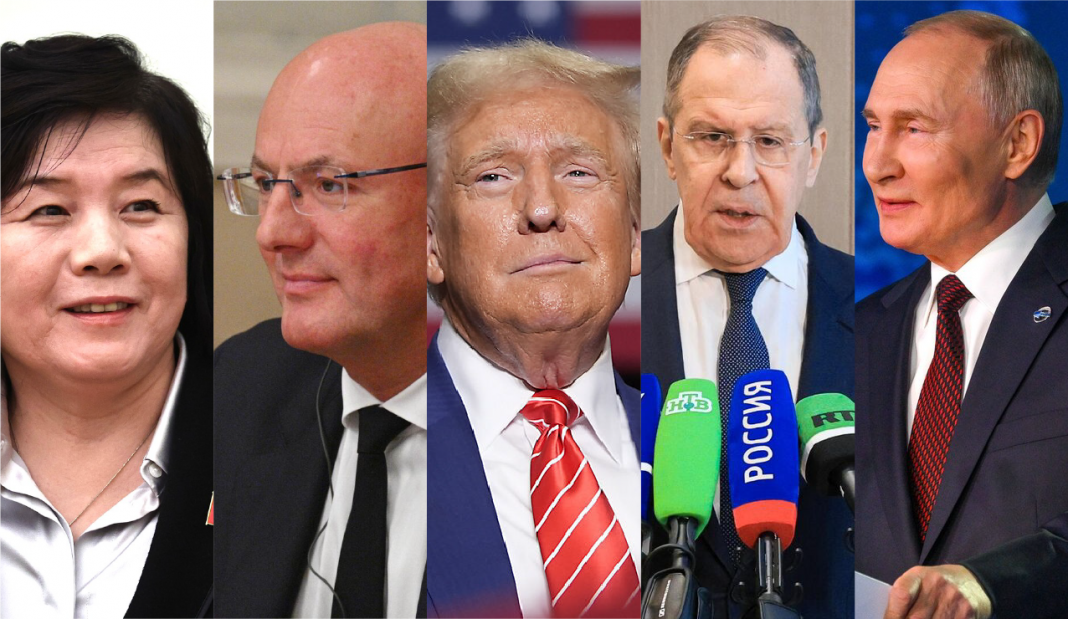In this digest, Ascolta presents a comprehensive analysis of key political, economic and social developments in Russia that have a direct impact on both the country’s domestic processes and international relations. We take an in-depth look at how Russian government decisions, economic developments and public sentiment are shaping the political agenda and affecting domestic stability.
Special attention is paid to the consequences of these events for Russia’s foreign policy, its relations with key international players, and possible changes in the global geopolitical landscape.
This Content Is Only For Subscribers
OFFICIAL EVENT OVERVIEW
- President of the Russian Federation
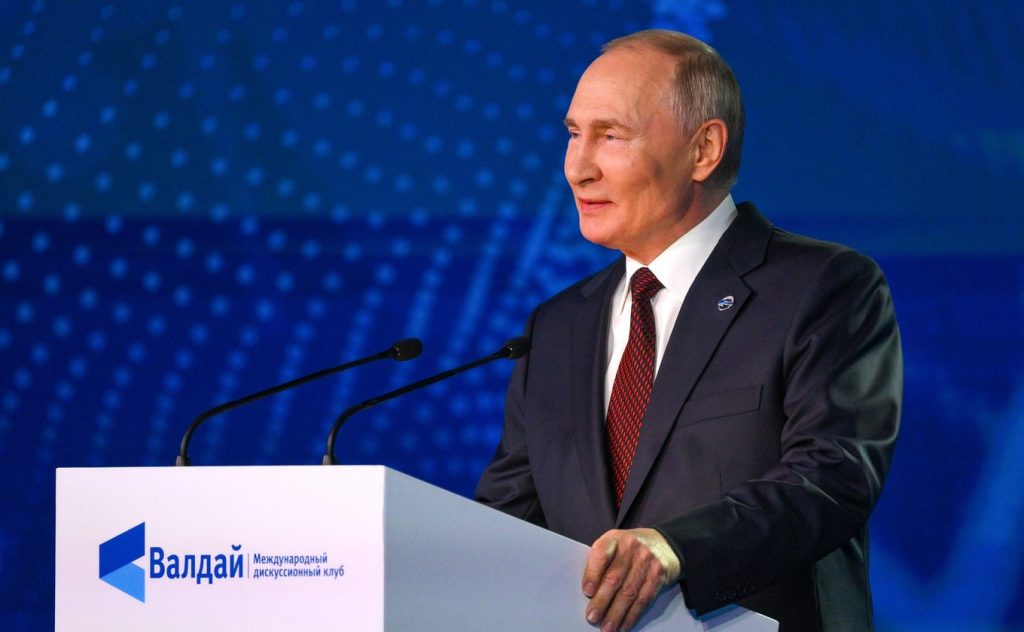
Despite numerous attempts to defiantly ignore domestic political processes in the United States, last week in Russia was as much focused as possible on the U.S. presidential election and the further process of reshaping foreign policy strategy to fit the new realities.
On Monday, November 4, Vladimir Putin began his working week with a meeting with North Korean Foreign Minister Choi Seong-hee. It is noteworthy that the results of the talks were not mentioned in the press releases of either country. The Russian side only noted that Russian Foreign Minister Sergei Lavrov and Presidential Aide Yuri Ushakov also attended the meeting. At the same time, on Nov. 9, Vladimir Putin signed a bill requiring ratification of a “comprehensive strategic partnership” treaty between Russia and North Korea. It is possible that Choi Seong-hee’s visit to Moscow was the final stage of negotiations, during which the fulfillment of guarantees by both sides was obtained.
Also, on Monday, Vladimir Putin made a number of reshuffles at the regional level. In particular, Rostov Region Governor Vasily Golubev announced his resignation, citing a move to another job. Alexei Smirnov, who previously served as deputy minister of transportation, was appointed acting governor. On the same day, the governor of the Tambov region, Maxim Egorov, also resigned, indicating his imminent appointment to a new position, at the federal level. Sergei Ivanov, who had previously worked in the Russian government apparatus, became the interim acting governor. It is important to note that Vasily Golubev was considered to be Dmitry Medvedev’s creator, while Maxim Egorov was in the orbit of influence of Sergei Sobyanin, and was also close to Sergei Kirienko.
On Tuesday, November 5, Vladimir Putin made two more reshuffles among regional leaders. In particular, Vladimir Uiba, head of the Komi Republic, announced his resignation, indicating his transition to work at the federal level. Vladimir Putin accepted his resignation and appointed Rostislav Goldstein, who previously served as governor of the Jewish Autonomous Region, as interim head of the Komi Republic. In connection with Goldstein’s transition to a new position, Putin appointed Maria Kostyuk as interim governor of the Jewish Autonomous Region. Prior to this appointment, Kostyuk served as deputy director of the Higher School of Public Administration at the Russian Presidential Academy of National Economy and Public Administration. It is important to note that Vladimir Uiba, who resigned, was also considered to be Sergei Sobyanin’s creator.
On the same day, Vladimir Putin accepted credentials from 28 newly arrived foreign ambassadors. The ceremony took place in the Alexander Hall of the Grand Kremlin Palace. Ambassadors of Myanmar, Burkina Faso, Malaysia, Bosnia and Herzegovina, Albania, Argentina, Belarus, Kenya, Laos, Kyrgyzstan, Ethiopia, Niger, Armenia, Azerbaijan and Zimbabwe presented their credentials to the Russian President. At the same time, among the newly appointed ambassadors there were also a number of representatives of states that Russia itself calls “unfriendly”. In particular, we are talking about the ambassadors of Japan, Canada, Israel, Malta, Italy, Spain, Ireland, Denmark, Belgium, the Netherlands and Finland. During the ceremony, Putin stated Russia’s desire to maintain dialog and cooperation with foreign states, emphasizing that “Russia is open to diplomatic ties and ready to cooperate on the basis of respect for sovereignty and national interests.”
On Thursday, November 7, one of the key political events of last week took place – Vladimir Putin’s speech at the plenary session of the XXI annual meeting of the Valdai International Discussion Club. The theme of this year’s meeting was proposed as follows: “A lasting peace – on what basis? Universal security and equal opportunities for development in the XXI century”. Earlier Ascolta noted that this platform can be used by Putin to voice strategically important theses in foreign policy processes. Moreover, as it became known, an informal telephone conversation between the Russian president and newly elected U.S. President Donald Trump took place on the same day. According to the available information, the parties discussed for the first time the situation in Ukraine and further ways to resolve it.
Below are the key points from Putin’s speech at the Valdai International Discussion Club meeting:
- “You and I are living in an era of cardinal, in fact, revolutionary changes, not only to comprehend, but also to be direct participants of the most complex processes of the first quarter of the XXI century”.
- “The old world order is irrevocably passing away, one could say it is already gone, and a serious, irreconcilable struggle is unfolding for the formation of a new one. Irreconcilable, first of all, because it is not even a battle for power or geopolitical influence. It is a clash of the very principles on which the relations of countries and peoples will be built at the next historical stage.
- “The threat is the imposition, the transformation of inherently totalitarian ideologies into the norm, as we see in the example of Western liberalism, today’s Western liberalism, which has degenerated, I believe, into extreme intolerance and aggression toward any alternative, toward any sovereign and independent thought, and today justifies neo-Nazism, terrorism, racism, and even mass genocide of civilians.”
- “Western calls for a strategic defeat of Russia, a country that possesses the largest arsenal of nuclear weapons, demonstrate the prohibitive adventurism of Western politicians.”
- “The West has accumulated really huge human, intellectual, cultural, material resources, thanks to which it can successfully develop, remaining one of the most important elements of the world system. But it is precisely “one of”, on a par with other actively developing states and groups of countries. Hegemony in the new international environment is out of the question.
- “The USSR helped states that had freed themselves from colonial or neo-colonial dependence, be it Africa, Southeast Asia, the Middle East or Latin America. And let me remind you separately that it was the Soviet Union in the mid-1980s that advocated the end of ideological confrontation, the overcoming of the legacy of the Cold War, in fact, the ending of the Cold War itself and then the overcoming of its legacy, those barriers that prevented the unity of the world and its comprehensive development.”
- “In the emerging multipolar world, there should be no losing countries and peoples, no one should feel disadvantaged and humiliated. Only then will we be able to ensure truly lasting conditions for inclusive, equitable and secure development”.
- “We have spoken many times about the destructive role that NATO continued to play, especially after the collapse of the Soviet Union and the Warsaw Pact, when the alliance seemed to have lost the formal, previously declared reason and meaning of its existence. It seems to me that the United States realized that this instrument was becoming unattractive and unnecessary, but it needed and still needs it today in order to rule in its zone of influence. That is why conflicts are necessary.
- “After the Cold War ended, there was a chance to overcome both bloc thinking and bloc politics.”
- “In the United States, in some states, energy costs three, four, or even five times cheaper than in the European Union. They consciously make decisions in the tax system, reduce income tax, let’s say, create conditions for the transfer of enterprises, entire enterprises or industries from Europe to the United States. And some people are moving.
- “You can berate Russia all you want, and we probably make a lot of mistakes too, but when they tell us that we signed the Minsk agreements on Ukraine only to give Ukraine an opportunity to rearm and we were not going to solve this conflict peacefully, what kind of trust can we talk about? What are you guys? What trust? You have directly, publicly stated that you cheated us, lied to us and deceived us. What kind of trust is that? But we need to return to this system of mutual trust gradually.
- “[About Trump] I can tell you: his behavior at the time of the attempt on his life, I don’t know, but I was impressed by it. He turned out to be a courageous man. And it’s not just the hand raised and the call to fight for their common ideals. It’s not just that, although, of course, it’s in the drive to do so. A man shows himself in extraordinary conditions – this is where a man shows himself. And he showed himself, in my opinion, in a very right way: courageously, as a man.
- “And I take this opportunity to congratulate him on his election as President of the United States of America. I have already said that we will work with any head of state in whom the American people place their trust. That will be true in practice as well.”
- “You know, I don’t think it’s shameful of me to call him either. I don’t do it because the leaders of Western countries have been calling me almost every week since some stage, and then suddenly they stopped. They don’t want to – well, they don’t have to. As you can see, we are alive and well, and nothing is wrong – we are developing and moving forward.
- “If any of them want to resume contacts, I have always said, I want to say again: we have nothing against it. Please, we will resume contacts and have discussions. But there are many people willing to have discussions, there is a whole hall here, but if not, we will have a discussion with you then.”
- “You know, we have never refused to continue the dialog in the field of strategic stability. I will not reveal a secret, everyone knows very well, and not only in this room, the whole world knows very well that the United States aims to defeat Russia, a strategic defeat.
On Friday, November 8, Vladimir Putin held a traditional meeting with permanent members of the Security Council of the Russian Federation. It is noted that the key topic of the meeting was the issue of measures of anti-terrorist protection of transport and transport infrastructure. Reports on the topic of the meeting were made by the Minister of Transport Vladimir Starovoit, as well as the Minister of Internal Affairs Vladimir Kolokoltsev.
- Ministry of Foreign Affairs of the Russian Federation
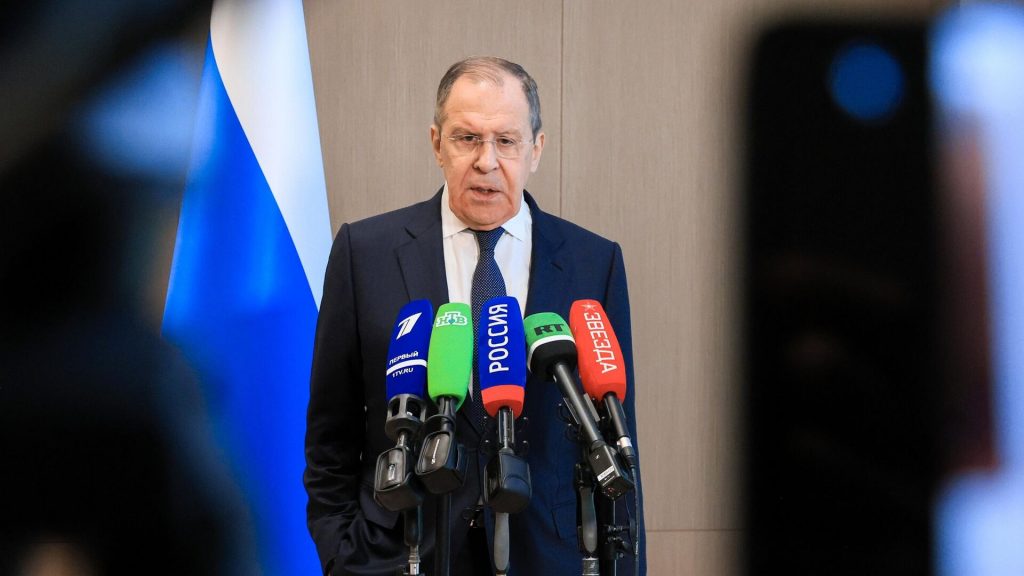
Last week, Russia’s foreign policy establishment also largely conducted its activities in the fairway of the results of the U.S. presidential election. However, in addition to the U.S., such important areas as Africa, the Middle East and Central Asia remained active.
Below are the key events to watch out for:
- On Monday, November 4, Russian Foreign Ministry spokeswoman Maria Zakharova, commenting on the results of the second round of the presidential election in Moldova, said that “the electoral process was characterized by unprecedented repression against the opposition and independent media, significant Western interference and the use of administrative resources by the Moldovan authorities.” Zakharova also pointed to discrimination against voters living in Russia, where only two polling stations were opened for the half-million-strong diaspora, while in Western countries the number of polling stations exceeded 200. External support for Sandu, according to Zakharova, has only exacerbated the split in Moldovan society, increasing the distance between the authorities and the interests of the country’s citizens who favor a neutral status and centuries-old ties with Russia. On November 3, Moldova held the second round of the presidential election, in which, according to the CEC, incumbent President Maia Sandu won with 55.33% of the vote.
- On Tuesday, November 5, Russian Foreign Minister Sergey Lavrov summarized the results of the BRICS summit and discussed the prospects for Russia’s further chairmanship in an interview with Rossiya Segodnya news agency. According to him, the summit in Kazan showed “the senselessness of attempts to internationally isolate Russia,” having gathered delegations from 35 countries and heads of key international organizations. The summit was the culmination of Russia’s presidency and led to the adoption of the Kazan Declaration, in which the participating countries supported the reform of the global economic system and the course of strengthening cooperation in BRICS. Lavrov noted the importance of creating independent financial platforms and expanding settlements in national currencies to increase resilience to external risks. Referring to the Palestinian-Israeli conflict, Lavrov emphasized that the BRICS countries are united in protecting the rights of civilians in Gaza and support the ceasefire resolution. Russia, together with its partners, submitted a draft resolution to the UN, but it was blocked by the US. According to Lavrov, Washington’s “politicized position” hinders the normalization of the situation.
- On Wednesday, November 6, the website of the Russian Foreign Ministry published a commentary on the results of the presidential election in the United States. It notes that “Donald Trump’s victory reflected the Americans’ dissatisfaction with the results of the Joe Biden administration and the policies of the Democratic Party”. According to the Foreign Ministry, the campaign against Trump with the use of administrative resources and liberal media could not prevent the victory of the Republican candidate, who bet on the economy and migration policy. The commentary also emphasizes that “the chronic flaws in the American democratic system have only intensified the internal split between Democratic and Republican states and the camps of ‘progressive’ and traditional values.”
- On the same day, the Ambassador of the Republic of Moldova in Moscow, Lilian Dariy, was summoned to the Ministry of Foreign Affairs of the Russian Federation. He was protested against the unfriendly actions of Chisinau, which refused to allow Russian observers to be part of the OSCE/ODIHR mission to the presidential election in Moldova. The Russian Foreign Ministry pointed out that the Moldovan authorities had denied accreditation to five Russian observers before the first round of voting and the referendum on EU accession. In the second round, three more members of the Russian delegation were denied accreditation at Chisinau airport despite having accreditation. These actions, according to the Foreign Ministry, violate Moldova’s international obligations, including the 1990 CSCE Copenhagen Document and the 2002 CIS Convention. The Foreign Ministry also noted that this behavior of Chisinau raises questions about the commitment to democratic standards that the Moldovan leadership is guided by as a candidate state to the EU.
- Russian Foreign Minister Sergey Lavrov spoke after the XXI meeting of the Valdai International Discussion Club in Sochi, where he discussed Eurasian security. Lavrov noted that “Putin has set the task of promoting cooperation among Eurasian countries to ensure stability and sustainable development on the basis of the principles of the UN Charter, rather than the dictates of NATO or the EU.” He also emphasized that these efforts are already being reflected in concrete steps, especially at the level of integration associations such as the EAEU, SCO and BRICS. He also noted that Western sanctions directed against Russia and other countries have fragmented the global system and led to the strengthening of regional structures, which Lavrov called a “healing process.” According to him, this process stimulates multipolarity and the creation of sustainable alternative systems – from payment platforms to logistics routes.
- On Friday, November 8, the First Secretary of the Canadian Embassy in Moscow was summoned to the Russian Ministry of Foreign Affairs and handed a note of protest in response to accusations of allegedly planned “Russian sabotage” against NATO countries, including the mailing of explosives. The Russian Foreign Ministry said that “these accusations, coordinated with the United States and its allies, are part of a hybrid war directed against Russia, including through support for Kiev and the participation of Canadian mercenaries on the side of Ukraine.” The ministry warned that responsibility for possible provocations “under a foreign flag” would be placed on the countries that make such unfounded accusations.
- On November 9-10, the first ministerial conference of the Russia-Africa Partnership Forum, established at the second Russia-Africa Summit in St. Petersburg in 2023, was held in Sochi at the Sirius University. The event gathered more than 1,500 participants, including ministers, representatives of integration associations, parliamentary and business circles of Russia and Africa. The central plenary session, chaired by Sergey Lavrov, opened with messages from Vladimir Putin and African Union President Mohamed Ould Cheikh El-Ghazouani. The meeting discussed key issues on the Russian-African agenda, including the implementation of the Forum’s Action Plan for 2023-2026. The ministers agreed on promising areas of cooperation, as set out in four joint statements on international information security, counter-terrorism, peaceful use of space and general political issues. The conference program included 20 panel sessions touching upon food security, digitalization, health care and other areas. There were also meetings between representatives of the EAEU and the African Union aimed at integration between the associations. Lavrov also held a number of bilateral meetings with the foreign ministers of the member states.
- Government of the Russian Federation
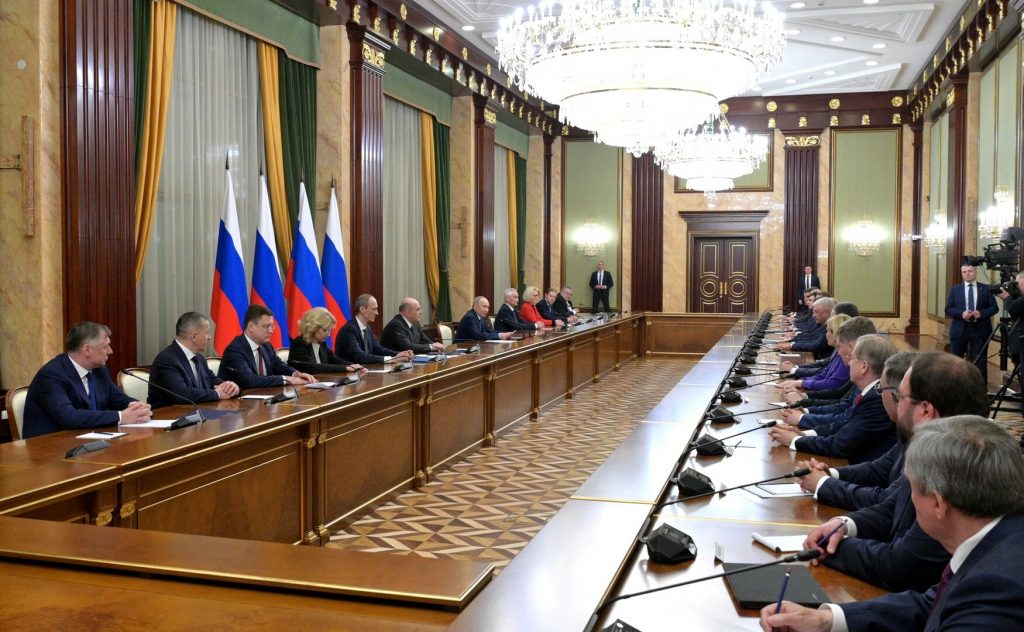
The Russian government worked in a regular mode last week. Below are the main events worth paying attention to:
- On Monday, November 4, Russian Prime Minister Mikhail Mishustin and Azerbaijani Prime Minister Ali Asadov had a telephone conversation. It is noted that during the conversation the heads of government discussed topical issues of bilateral trade-economic and scientific-technical cooperation, paying special attention to joint projects in the field of industry and transport infrastructure.
- On Tuesday, November 5, Minsk hosted a meeting of the Council of Ministers of the Union State held by Mikhail Mishustin and Prime Minister of Belarus Roman Golovchenko. The meeting was timed to the 25th anniversary of the signing of the Treaty on the Establishment of the Union State. It is noted that the meeting discussed the results of joint work of the governments in 2024 within the framework of union integration, as well as topical issues of union building. Special attention was paid to preparations for the upcoming meeting of the Supreme State Council of the Union State, scheduled for early December. Mishustin stressed that the technological sovereignty of the Union State is being strengthened, jointly modernizing and increasing capacities in machine and machine tool building, microelectronics, mastering the production of equipment and components to replace imports. In turn, Golovchenko noted that the union construction helps Belarus and Russia to effectively confront modern challenges and threats, creates the necessary conditions for further successful development of our countries, improving the well-being and living standards of their peoples. The meeting resulted in the signing of a number of important documents aimed at further deepening integration and cooperation between Russia and Belarus.
- On Wednesday, November 6, Deputy Prime Minister of the Russian Federation Alexander Novak spoke at the XXI meeting of the Valdai International Discussion Club in Sochi. He discussed the Government’s key tasks in the field of economy and energy, as well as the prospects for economic cooperation with friendly countries, including BRICS and the global South. Novak noted that despite external challenges, the Russian economy continues to grow. In 2023, he said, Russia’s GDP grew by 3.6 percent and investment increased by 9.8 percent. In the first nine months of 2024, GDP grew by 4% and is expected to grow by 3.9% by the end of the year.
- On Thursday, November 7, a regular meeting of the Government of the Russian Federation was held. The agenda included the following issues: preliminary results of harvesting in 2024; measures for the development of the agro-industrial complex (AIC); support for the development of economic growth centers in the Far East; results of the All-Russian contest “Best Municipal Practice”.
- On Friday, November 8, Deputy Prime Minister of the Russian Federation Dmitry Chernyshenko met with Venezuelan President Nicolas Maduro during his working visit to Caracas. At the meeting, Chernyshenko thanked Maduro for his participation in the BRICS summit and congratulated him on his re-election. He noted that Russia and Venezuela have strong friendly and strategic ties that are not subject to political conjuncture. During the 18th meeting of the high-level Intergovernmental Russian-Venezuelan Commission, Chernyshenko and Venezuelan Vice President Delcy Rodriguez discussed cooperation in energy, trade, science, pharmaceuticals and other areas. At the meeting they signed the final act of the commission and a plan for the development of Russian-Venezuelan cooperation until 2030. Among the agreements signed are agreements on cooperation in science and technology. Rodriguez emphasized that the commission has strengthened bilateral ties and deepened partnerships, especially in science and technology.
REVIEW OF KEY EVENTS IN THE INFORMATION SPACE
- Vladimir Putin’s phone conversation with Donald Trump
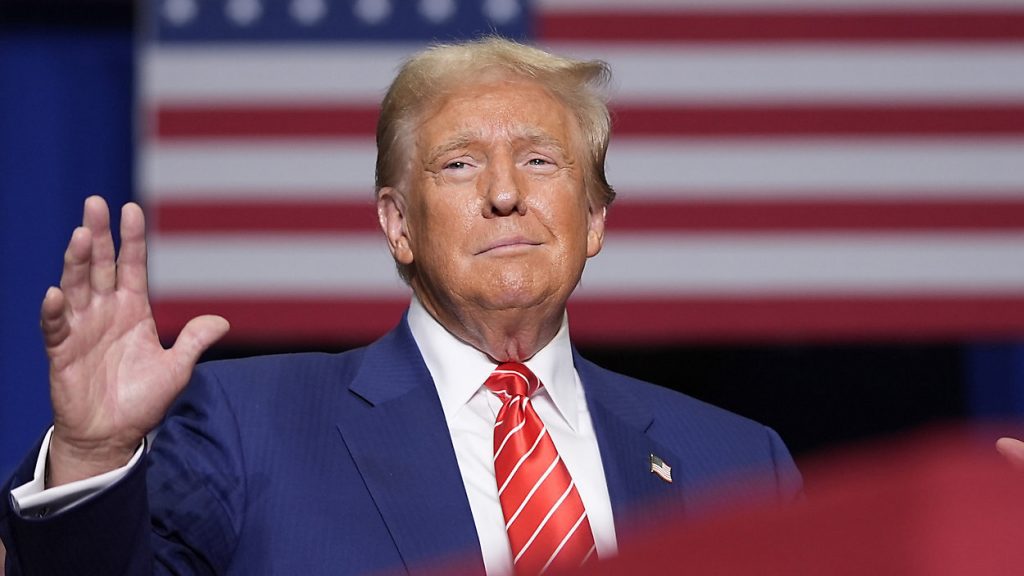
On Sunday, November 11, The Washington Post reported that Donald Trump and Vladimir Putin had a phone conversation on November 7. The possibility of ending the war in Ukraine was discussed, with Trump expressing concern about the cost to U.S. taxpayers of supporting Ukraine. He suggested that the world may require Ukraine to make concessions in some territories, such as Crimea. Also, according to the publication, Trump advised Putin not to aggravate the conflict in Ukraine.
Sources familiar with the conversation said the leaders discussed prospects for peace in Europe, and Trump expressed interest in further contacts to resolve the conflict in Ukraine. The Ukrainian government was aware of the conversation, and Ukrainian officials “understand that Trump will engage with Putin to reach a diplomatic solution.”
According to WP, Trump has privately signaled that he would support a deal in which Russia retains some of the seized territories and mentioned this topic in his conversation with Putin. It is also noted that Trump expressed his displeasure with significant US spending on support for Ukraine, which raises the question of a possible cut in US aid.
Trump has warned Putin against further escalation, citing concerns that he does not want to face a deepening crisis in Ukraine when he takes office. According to sources, Trump fears a new wave of attacks on the Ukrainian energy system, including strikes on nuclear power plant substations, which could completely destroy the country’s energy infrastructure. There is speculation that the topic was raised by Vladimir Zelensky during his conversation with Trump the day before his conversation with Putin.
However, despite Trump’s advice, if Russia is indeed planning such an attack, the Kremlin may decide that the possible benefits of destroying Ukraine’s energy sector outweigh the risks of displeasing a future U.S. president. Such a strike could be used to pressure Ukraine and the West before Trump’s inauguration.
It is important to note that it was on November 7 that Vladimir Putin first congratulated Trump on his election victory, expressing his willingness to cooperate. This move, as well as positive reactions from Russian officials, suggest that Moscow perceives the conversation with Trump as a constructive start to the dialog.
RESULTS OF THE WEEK: ANALYTICAL REVIEW BY ASCOLTA
The past week in the Russian Federation was marked by reflexions on the U.S. presidential election. Initially, the Russian leadership was focused on the chaos that could arise in the United States due to the possible non-recognition of the election results by the losing side, as well as a possible confrontation between the president and Congress (in case the Democrats formed a majority in Congress). A total Republican victory was not part of Russia’s strategic plans.
Speeches by Russian politicians over the past week were part of a cautious probing of the ground for a possible dialog between Moscow and Washington. Putin tried to be diplomatic in his statements, made a number of assumptions and set new conditions for peace talks. There is now a sense of “strategic confusion” among the Russian leadership about how to deal with Trump.
At the same time, the United States does not have a clear understanding of what to do with Russia. Much will depend on who will form the core of Trump’s team. So far, Trump continues to make statements in the logic of the election campaign, but it is already clear that he is not ready to see “hawks” like Haley and Pompeo around him. In addition, Trump’s main interests will be focused on the Middle East, and Russia could theoretically offer the U.S. some kind of pact on Middle East settlement in exchange for neutrality in the Ukrainian issue or in exchange for guarantees of non-expansion of NATO.
It is important to note that several Ascolta sources have said that the Kremlin has been working on a possible proposal that could amount to the elimination of NATO as a bloc in exchange for the return of the temporarily occupied territories of Ukraine, excluding Crimea. The analysis of this idea is deeply questionable, but some of Vladimir Putin’s statements at the Valdai Forum may indicate that there are indeed supporters of such an idea in his entourage.
In any case, a period of foreign policy changes and revision of previous foundations and doctrines awaits Russia in the near future.

